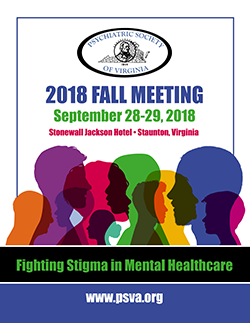Spring 2018 Issue |
|
In the News
The Benzodiazepine Epidemic Percolating Beneath the Opioid Epidemic
By Stephen Cunningham, MD
As a psychiatrist who practices in both out-patient and in-patient private practice settings, I have worked with patients who struggle with a variety of addictions. In psychiatry, each of us are acutely aware of the growing number of opiate-related deaths that occur in our communities. I am grateful for the increased media attention and community resources that are being placed on opiate dependency and better treatment options. I have witnessed the life-changing benefits that my patients receive while on naltrexone or suboxone. I have seen the sense of achievement and pride experienced by patients who had previously been unable to resist the demands of a fentanyl-laced syringe of heroin for more than 24 hours. They are now beginning to live independent lives to the amazement of their families.
We are witnessing seismic shifts in how we, as a medical community, approach the treatment of pain, how we train our medical students, and how we attempt to educate the general public about rational treatment of opiate dependency. These are changes that have needed to be implemented for years, and yet sadly, it has taken the deaths of tens of thousands of our fellow citizens for this change to occur (the latest APA estimates are in excess of 50,000 deaths related to opiates in 2016). Until now, we as a medical community have been complicit. We too share the blame along with the pharmaceutical conglomerates who have resisted greater regulation and along with politicians who attempt to hamstring DEA efforts to curtail opiate diversion.
Unlike our recent efforts within the medical community to police ourselves and to attempt to decrease new opiate addiction cases by prescribing less opiates, there has been relative silence regarding the need to change our policies on our benzodiazepine prescribing habits. This occurs despite growing evidence that a common denominator exists for increased emergency department visits, higher risk of dementia and falls in our elderly patients as well as increased risk of motor vehicle accidents: the likelihood of being prescribed a benzodiazepine. While the benefits of short-term use of benzodiazepines for acute anxiety or insomnia is well- documented, so are the many risks of long-term benzodiazepine maintenance treatment.
In my practice, my colleagues and I treat a growing number of patients who have developed a powerful psychological and physiological dependency upon benzodiazepines. While the short-acting benzodiazepines such as alprazolam (xanax) and lorazepam (ativan) represent the largest share of my benzo-dependent patients’ medication regimen, I have treated many patients addicted to any or all of the GABA-ergic medications. The scenarios are strikingly similar: a 50+ year old male or female who presents to me following the retirement of their primary care physician or psychiatrist. They are running out of their medications and they are in a panic. They experienced acute anxiety in their 20s or 30s. They were prescribed a benzodiazepine, they felt profound symptom reduction, and they stayed on the medication. Their dosage steadily increased along with a corresponding increase in their dependency. Fast forward 20 years, and their original dose of xanax 0.25mg bid prn has now blossomed to a scheduled dose of 2mg tid, perhaps now with a supplemental ambien 10mg qhs, washed down with 2 glasses of pinot noir. This dose regimen, which could render unconscious a full grown horse, is now “just enough” to keep this patient’s symptoms stable. The symptoms for which they began taking the medication, are now intensified; they complain of rebound anxiety, rebound insomnia, and unexplained gastrointestinal discomfort and muscle spasms. Did your physician discuss the habit-forming potential of these medications with you? Uniformly they say no. Most often, through no fault of their own, they have developed an iatragenic addiction to arguably one of the most powerfully habit-forming classes of psychiatric medications produced by the pharmaceutical industry.
I am grateful that I had the opportunity to train under Dr. Michael Bohan, a Virginia Beach-based addictionologist. It was Dr. Bohan who introduced me and my fellow psychiatric residents to the benzodiazepine detoxification protocol written by British physician Dr. Heather Ashton (The Ashton Manual: benzo.org.uk). In it, she describes in language that can be easily digested by the general public, the mechanism of action of benzodiazepines, how they can be both initially helpful and often progressively harmful. She also describes the process needed to slowly and safely detoxify patients off of benzodiazepines to avoid possible seizures and unnecessary and excrutiating physical and emotional discomfort.
Just as with all of my patients struggling with opiate dependency, I have learned so much from my patients who struggle with benzodiazepine dependency. I continue to be amazed at their resiliency, as each individual slowly develops a sense of achievement and empowerment. At the beginning of a slow taper off of benzodiazepines, did any patient think that they could live without the 8 mg daily dose of klonipin that had developed a vice-like hold on their lives? No. Each patient started with the same level of doubt and fear, and each began the slow process of lifting the addictive yoke from their neck.
As psychiatrists, we should be leaders in the field of addiction. We have appropriately led the way in opiate addiction treatment. As more patients approach us with the legitimate question of “why did no doctor talk to me about the addictive potential of my medication?” we should be able to provide them with comfort, education and a rational course of treatment. We are doing this for our patients as we face the epidemic of opiate addiction. We should do so as we look in the mirror and begin to face the growing epidemic of benzodiazepine addiction.
YOUR NEWSLETTER IS NOW AVAILABLE ON YOUR SMARTPHONE AND TABLET!
JOIN PSV TODAY!
REGISTER TODAY!
PSV 2018
FALL MEETING
September 28-29, 2018
Stonewall Jackson Hotel
Staunton, Virginia
APA Find a Psychiatrist
Are you accepting new patients?
Opt into APA’s “Find A Psychiatrist” database. To view the functionality or opt-in, CLICK HERE
FYI: A link for this option has been added to the PSV websiteSelect the “About” button and then “Find a Psychiatrist” from the drop down.






